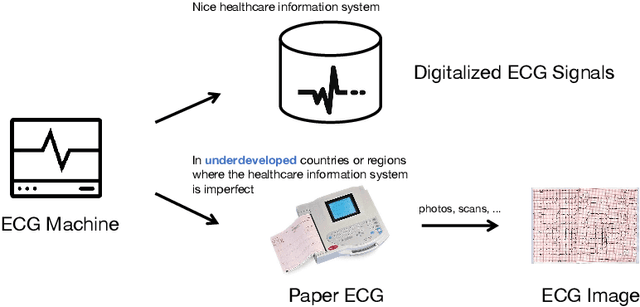Yongkui Li
Artificial Intelligence System for Detection and Screening of Cardiac Abnormalities using Electrocardiogram Images
Feb 10, 2023



Abstract:The artificial intelligence (AI) system has achieved expert-level performance in electrocardiogram (ECG) signal analysis. However, in underdeveloped countries or regions where the healthcare information system is imperfect, only paper ECGs can be provided. Analysis of real-world ECG images (photos or scans of paper ECGs) remains challenging due to complex environments or interference. In this study, we present an AI system developed to detect and screen cardiac abnormalities (CAs) from real-world ECG images. The system was evaluated on a large dataset of 52,357 patients from multiple regions and populations across the world. On the detection task, the AI system obtained area under the receiver operating curve (AUC) of 0.996 (hold-out test), 0.994 (external test 1), 0.984 (external test 2), and 0.979 (external test 3), respectively. Meanwhile, the detection results of AI system showed a strong correlation with the diagnosis of cardiologists (cardiologist 1 (R=0.794, p<1e-3), cardiologist 2 (R=0.812, p<1e-3)). On the screening task, the AI system achieved AUCs of 0.894 (hold-out test) and 0.850 (external test). The screening performance of the AI system was better than that of the cardiologists (AI system (0.846) vs. cardiologist 1 (0.520) vs. cardiologist 2 (0.480)). Our study demonstrates the feasibility of an accurate, objective, easy-to-use, fast, and low-cost AI system for CA detection and screening. The system has the potential to be used by healthcare professionals, caregivers, and general users to assess CAs based on real-world ECG images.
CardioLearn: A Cloud Deep Learning Service for Cardiac Disease Detection from Electrocardiogram
Jul 04, 2020



Abstract:Electrocardiogram (ECG) is one of the most convenient and non-invasive tools for monitoring peoples' heart condition, which can use for diagnosing a wide range of heart diseases, including Cardiac Arrhythmia, Acute Coronary Syndrome, et al. However, traditional ECG disease detection models show substantial rates of misdiagnosis due to the limitations of the abilities of extracted features. Recent deep learning methods have shown significant advantages, but they do not provide publicly available services for those who have no training data or computational resources. In this paper, we demonstrate our work on building, training, and serving such out-of-the-box cloud deep learning service for cardiac disease detection from ECG named CardioLearn. The analytic ability of any other ECG recording devices can be enhanced by connecting to the Internet and invoke our open API. As a practical example, we also design a portable smart hardware device along with an interactive mobile program, which can collect ECG and detect potential cardiac diseases anytime and anywhere.
 Add to Chrome
Add to Chrome Add to Firefox
Add to Firefox Add to Edge
Add to Edge